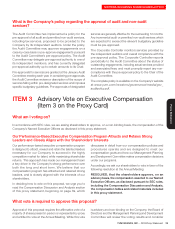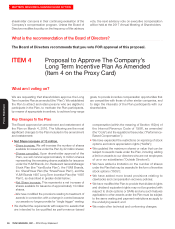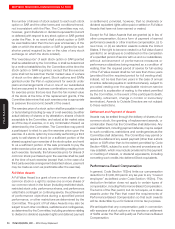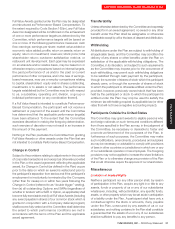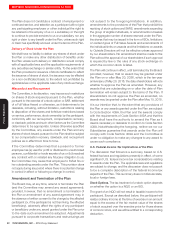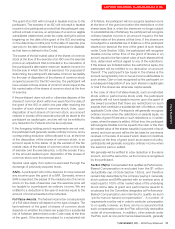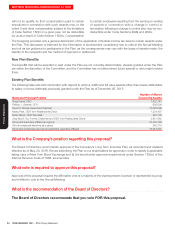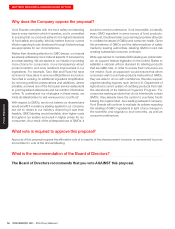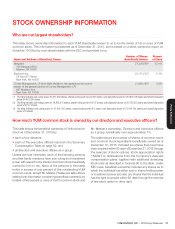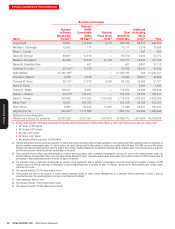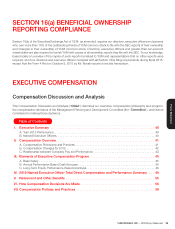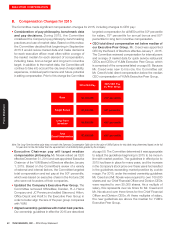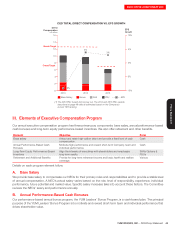Pizza Hut 2015 Annual Report Download - page 49
Download and view the complete annual report
Please find page 49 of the 2015 Pizza Hut annual report below. You can navigate through the pages in the report by either clicking on the pages listed below, or by using the keyword search tool below to find specific information within the annual report.
YUM! BRANDS, INC.-2016Proxy Statement 35
Proxy Statement
MATTERS REQUIRING SHAREHOLDER ACTION
ITEM5 Shareholder Proposal Concerning
Responsible and Accurate Labeling
(Item5 on the Proxy Card)
What am I voting on?
William C. Fleming and Jacquelyn Howard have advised
us that they intend to present the following shareholder
proposal at the Annual Meeting. We will furnish the address
and share ownership upon request.
RESOLVED: The Corporation shall expand its current
labeling policy on all of its food products to acknowledge
the use or absence of genetically modified organisms
(GMOs).
There are four reasons supporting the passage of this
resolution:
1. In order to foster the credibility of the Corporate brands
and to establish consumer confidence in the quality
and content of the Yum! product line.
2.
To enable consumers to make informed choices with
respect to the brands available that will enhance the
appreciation and marketability of the product.
3. Genetically modified foods are at the center of a
controversy about the impact of these organisms on
the health of the individual consumer as well as the
agricultural environment in general. At issue is the
perception of inadequate testing of GMOs by FDA,
USDA or independent evaluative agencies. Reliance
on information generated by the companies that are
producing and profiting from these entities is insufficient
to satisfy the concerns of an inquisitive public.
4.
We are in an environment of heightened interest in the
quality and content of commercially produced foodstuffs.
Many states have already moved to require labeling of
genetically modified organisms. We the shareholders
call upon the Corporation to take the lead in labeling
GMOs in the product line thereby demonstrating Yum!’s
concern for environmental health, the safety of consumers
and their right to know the contents of the food they
purchase.
Management Statement in Opposition to Shareholder Proposal
What is the Company’s position regarding this proposal?
Our Board of Directors unanimously recommends that
stockholders vote AGAINST this proposal.
Mandatory labeling for foods developed through bio-
technology (also known as “genetically modified” foods)
risks creating an unnecessary stigma for foods that leading
authorities have deemed safe and not materially different
from those not developed through biotechnology.
Genetically modified organisms (“GMOs”) are commonly
used in crop production and have been grown commercially
since 1996. The U.S. Food & Drug Administration (“FDA”)
estimates that approximately 90% of corn and soybeans
planted in the U.S. contain GMOs. Farmers use this
technology to produce higher crop yields, improve farming
sustainability, use less pesticides and water, and reduce
greenhouse gas emissions.
Health officials at the FDA, the U.S. Department of Agriculture,
the U.N. World Health Organization, the U.N. Food and
Agriculture Organization, Health Canada, and numerous
other government health authorities have found GMOs to
be safe and have found no negative health effects associated
with their use. These conclusions are based on hundreds
of studies that have concluded that GMOs do not pose a
threat to human or animal health. Experts at the American
Medical Association, the National Academy of Sciences,
and the British Royal Society concur that there are no health
risks associated with GMO foods or ingredients. Indeed,
many of these organizations strongly support the further
development and adoption of foods developed through
biotechnology due to their potential to increase agricultural
productivity and improve the nutritional value of foods.


